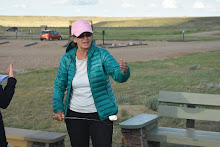Part Two: Conserving Propane
See Nov 17th for Part One
Now that we are using the wood stove, propane consumption should diminish considerably. In the summer our propane consumption is typically 5% per month. My goal is to cut our propane consumption by 20% so we can get a full year's use from one tank of propane. Is this achievable? Several adjustments will contribute to the goal.
One will be the use of cooking with electricity during our sunny surplus days in the summer. An electric counter toaster oven may be purchased for such use. Presently our electric slow cooker, kettle and charcoal BBQ all help reduce our use of propane.
The second adjustment could be using our wood stove for cooking during the winter. Our wood stove has a flat surface which makes it easy to heat a pot of soup or stew and those are two dishes perfect for winter consumption.
For us wood for the stove is readily available on our property. It isn't free, as we need to cut, haul, stack and dry it well in advance of using it, but it is abundant and far cheaper than propane.
A third consideration is an electric water heater to bring our cold well water up to a more moderate temperature before it enters the propane water heater to be heated for domestic use.
For us this would be a cheaper approach than installing a solar water heater as such a system would require a huge tank of water for storage during the high production summer months. A solar water system is so efficient that it will produce a huge quantity of very hot water and a hot tub or swimming pool is recommended as a place to dump the excess hot water. It is easier and cheaper if we simply install a small electric water heater and turn it on and off as required.
A final step would be a heating coil around our wood stove to heat water during the winter months but that might not be aesthetically acceptable sitting in our living-room.
Reducing our reliance on propane to heat our water, our house and for cooking is achievable but it will never be eliminated. Also the convenience of propane makes this off grid living feasible as we age. The assurance that we can cook, heat the house and our water without the chore of hauling in wood allows us to stay here in comfort even as some tasks we easily do today become impossible tomorrow.
Bottom line: Our system so far has exceeded our expectations. We couldn't be happier. We are comfortable, content and spoiled living in the bush without the noise of the city or a generator running outside our door.
We have all the conveniences we need to prepare meals, stay clean and warm throughout the year and we are not tied into the grid system.
We do need to keep an eye on the sun and make adjustments if the forecast calls for extended periods of cloudy days. But those adjustments are minor and not life changing.
We may do the laundry later in the week when the sun is out rather than on a cloudy day when it would draw down our batteries. We installed LED lights as they draw less power and our house is super insulated which keeps us warmer in winter and cooler in summer without high energy demands. We do not have air-conditioner, don't need it as the house design contributes to its comfort level.
If you are considering building and living off the electrical grid and have some questions don't hesitate to send us an e-mail. We are not experts but we are living off grid and hopefully can answer your questions.
Thanks for stopping by and safe travels.
Monday, 18 November 2013
Subscribe to:
Post Comments (Atom)








No comments:
Post a Comment